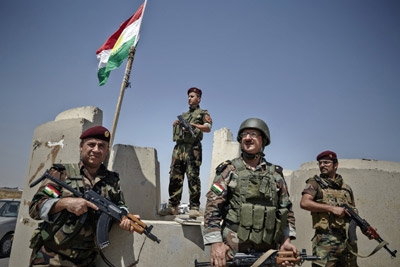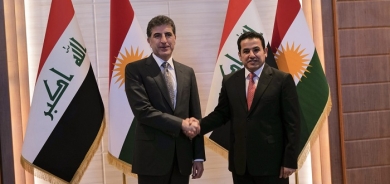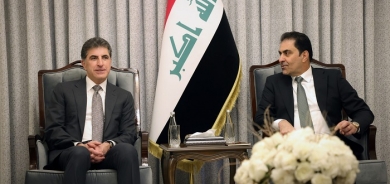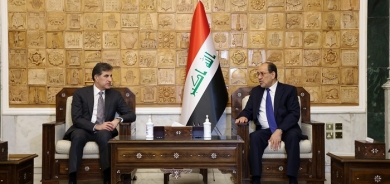Kurds and US vs ISIS
November 20, 2014
From Media

"[The Kurds] are the absolute antithesis of ISIS. [With] ISIS you have these incredible fundamentalists that are bloodthirsty and who believe they are doing God's work, and then you have these Marxist secularists, many of them even atheists, who are fighting for their own local rights and Kurdish rights in the region," reported Richard Engel, the gold standard for American foreign news correspondents. In his reporting, Engel singled out the Kurds as the most important factor in the fight for Kobane, a town whose struggle has become symbolic of the fight against ISIS.
With the talk around air strikes being that we need ground support and our war-weary country unwilling to put boots on the ground, the Kurds are a very important potential ally that we have already been supporting. Who are the Kurds, however, and what do they want? For this, I interviewed my roommate, Demet Arpacik, who is active in political and cultural clubs to press of the rights of her people.
"The Kurds are an ethnic people, with roots in countries like the Caucuses and Iran. We have been in Mesopotamia as tribes for a long time, with little interaction with others for much of this. This has led us to have a strong ethnic identity, even as the British Empire split our homeland up as a part of several different countries," explained Demet.
"We have faced horrible treatment in the countries that we were broken up into. For example, we were gassed by Saddam Hussein in Iraq, have suffered riots with high death tolls and a massacre back in 1938, also known as the Dersim massacre, carried out by Turkey. We continue to deal with deep institutional discrimination still today. For example, despite the fact that Kurds make up about 9 percent of the population, they have trouble getting an ID in Syria. This is because the government refused to make them available to those who speak only Kurdish, which is a large portion of my community. This was one of several institutional factors that make it more difficult to get healthcare and access to public education."
With the institutional discrimination they have faced, it wasn't shocking that the Kurds declared a measure of independence in Kobane.
"After Kobane claimed independence, they aimed to open their own educational and health care institutions. Kurds believe that the countries they are part of will never grant them their full rights and, therefore, they need to take a step. Assad would not allow this autonomy and would probably crash the whole region by now, but since they are fighting ISIS, Assad does not oppose their autonomous region."
This autonomous region is a big part of what the Kurds ultimately want, as there isn't a strong consensus for an independent nation.
"What we want is ultimately a greater measure of autonomy. While my people are still emotionally connected to the idea of an independent Kurdistan, our most respected leader and the founder of PKK (Kurdistan Workers' Party, which involved in armed conflict with the Turkish state starting from 1984 until 2009 ceasefire), Abdullah Öcalan, has spoken against this. Abdullah reasoned that, since we have seen so much oppression at the hands of other countries, forming our own is not the solution we should pursue. Instead, we hope to continue to gain a greater degree of linguistic and cultural rights and territorial independence within our lands as part of all four countries we inhabit."
Demet then delved into some of the more complicated politics between the Kurds and other actors.
"America has been hesitant to provide any assistance to Kobane because its ally, Turkey, did not want it. Turkey sees the YPG (People's Protection Unit) and YPJ (Women's Protection Units) as affiliated with PKK, which is viewed as terrorist organization both by Turkey and the US. The US tried to convince Turkey in the beginning, but Turkey's reluctance has pushed the US to help with airstrikes in the 30th day of resistance in Kobane. A week ago, 150 Peshmerge also crossed the border from Iraqi Kurdistan to Turkey and then to Kobane to help Syrian Kurds. Turkey is believed to have accepted this due to insistence by the USA and it's membership in the international coalition against ISIS. However, it has been claimed and reported many times that Turkey directly and indirectly helps ISIS forces who fight Assad. Although Joe Biden criticized Turkey, he quickly had to walk back his statement."
The situation looks familiar: religious extremists without a nation fighting to spread their ideology, something we've walked into as a country before. The biggest failure in past US-led Middle East interventions has been the inability to plan for the day after the existing power structure is changed, and it is hard to tell who will fill a power vacuum.
In this case, those secular Kurds who would retain control against ISIS over in the Kurdish region are more moderate than even the countries they are now a part of: a good example of this is that the Kurdish authorities in the Kurdish region of Syria declared full equality for women in "in all walks of public and private life," and their women take part in the fighting.
Allying with Kurdish forces means we can better fight ISIS, as well as empower a Democratic, secular, autonomous region to remain as a front against religious extremism in the area with the same investment: while politics is certainly unstable and there can be deep, unintended consequences, it certainly seems like a wise investment for the US. Either way, there is no denying that our short-term security interests are intimately tied to the safety of the Kurds and other secular and moderate forces who will be resisting ISIS.
The Huffington Post











